Today we are going to share an Excerpt from the Topic "Meaning of ‘Sumiran Ka Ang’ - 1" in the Book Yatharth Bhakti Bodh by the Grace of Spiritual Leader Saint Rampal Ji.
Meaning of ‘Sumiran Ka Ang’
These religious practices are imperative for the bhakti (worship) of Supreme God:-
Yagya i.e. religious ritual: - There are many types of Yagyas. Example: -
Dharm Yagya: - To provide communal meals, to build inns, drinking water kiosks etc.
Dhyaan Yagya: - To engross oneself unceasingly in God is Dhyaan Yagya of Sant Mat. Some people by calling it ‘Meditation’ in English have completely changed its definition. Their belief i.e. principle is that ‘Meditation’ is to become thoughtless by sitting in a solitary place and shutting one’s eyes. It has been said to be a part of Yogaasan. They believe that many physical treatments are also done with this. Just think, it is an exercise which is done for the mind.
The Dhyaan (Meditation) in Sant Mat is thinking about God every moment with the yearning to attain Him; just as when a person develops tension, his mind is focussed on that particular thing every moment. One cannot deviate even on trying. Likewise, the mental tension for God which is called contemplation of God is said to be Dhyaan Yagya in Sant Mat.
Hawan Yagya: - This Yagya is performed in many ways: -
Those who call themselves ‘Vedvit’, they make fire pits, or purify earth with mud plaster, and then burn firewood and while pouring ghee of cow or buffalo, utter some mantras of Vedas. They perform Hawan Yagya in this way. Some people only perform Hawan Yagya by lighting incense or incense sticks. They consider incense or incense sticks to be made with ghee. Some people perform Hawan Yagya by crushing herbs, mixing them with ghee and pouring them over ember of fire.
Please think: - Every worshipper should only perform acts of bhakti mentioned in our holy texts. It is also stated in Shrimad Bhagavat Gita Chapter 16 Verses 23-24 that a worshipper who relinquishing the injunctions of scriptures, follows arbitrary practices, neither attains happiness, nor spiritual success, nor salvation. (Gita Chapter 16 Verse 23)
Therefore, for you Arjun! To ascertain which acts of bhakti one should do and which acts of bhakti one should not do, scriptures are the only evidence. (Gita Chapter 16 Verse 24)
Vedas are the only scriptures for the way of worship. Vedas are of two types: -
General Vedas: - which are four in number – Rigved, Yajurved, Samved and Atharvaved. Shrimad Bhagavat Gita is the summary of these very four Vedas.
Sukshm Ved: - This is that Ved which Supreme God, by manifesting on Earth, Himself narrates from His lotus-mouth in the form of poetry. According to Gita Chapter 4 Verses 32 and 34, it is also called Tatvgyan. It is complete spiritual knowledge. Its description is also given in Rigved Mandal 9 Sukt 86 Mantra 26-27, Rigved Mandal 9 Sukt 82 Mantra 1-2, Rigved Mandal 9 Sukt 20 Mantra 1, Rigved Mandal 9 Sukt 94 Mantra 1, Rigved Mandal 9 Sukt 95 Mantra 2, and Rigved Mandal 9 Sukt 96 Mantra 17-18.
Sant-Mat: - Sant-Mat is based on Sukshm Ved. In this, there is provision of Hawan Yagya by lighting a lamp with the pure ghee (clarified butter) of cow or buffalo. This is called ‘Jyoti Yagya’. It is also endorsed by Rigved Mandal 9 Sukt 86 Mantra 10 that a worshipper should perform Hawan Yagya by lighting a lamp. The Nectar-speech of Sukshm Ved, because of being uttered from the lotus-mouth of God, is more effective. We perform Jyoti Yagya and also make our disciples perform it. We utter Aarti (prayer) and other speech from Sukshm Ved.
Pranaam Yagya: -
It is of two types: -
Namaskar i.e. Pranaam (salutation): - In this, with folded hands and bowing one’s head, word ‘Namaskar’, ‘Pranaam’ or ‘Namaste’ is spoken which is for distinguished gods and human beings. In Gita Chapter 18 Verse 65, and Chapter 9 Verses 14 and 34, the Speaker of the knowledge of Gita has stated that – (Namaskar) Salute me.
Dandwat Pranaam (Prostration): - In this, one has to lie prone on ground; by joining hands straight overhead and also joining feet, by remaining straight like a stick, the word ‘Pranaam’ or ‘Namaskar’ is spoken. This is called Dandwat Pranaam. This has to be only done to a Supreme Saint or Complete God. The Speaker of the knowledge of Gita has given its evidence in Gita Chapter 4 Verse 34. He has stated that prostrate before the saint who has Sukshm Ved i.e. Tatvgyan (complete spiritual knowledge) with him.
Gyan Yagya: - To read Holy Books, and listen to the thoughts of saints i.e. listen to and narrate spiritual discourses is said to be Gyan Yagya. In the practice of Bhakti, there is also practice of ‘Naam Smaran’ (mental recitation of mantra). The interpretation that will be done now is related to the religious practice of (Naam Smaran) mental recitation of mantra. A few nectar-speeches of Sukshm Ved will be interpreted here that are written in the daily Paath.
From “Sumiran (Smaran / Mental-Recitation) Ka Ang”
Speech: - Kabir, sumiran maarag sahaj ka, Satguru diya bataay |Shwaans-ushwaans jo sumirta, ek din milsi aay || (1)Kabir, maala swaans-uswaans ki, ferenge nijdaas |Chauraasi bharmae nahin, katae karam ki faans || (2)
Meaning: - Supreme God Kabir by Himself appearing on earth in the first phase of Kalyug narrated this Sukshmved (Tatvgyan) from His lotus-mouth in the form of proverbs, hymns, couplets and quatrains. As a result of which, Supreme God Kabir has also obtained the title of a famous poet. In the practice of Bhakti, the correct and (Sahaj) easy way of ‘Naam Smaran’ (mental recitation of mantra) has been described that is done through (Shwaans-Ushwaans) outgoing and incoming breaths. The breath that comes out is Shwaans; breath that goes inside the body is Ushwaans. There is instruction to chant Satnaam in this way. This is the actual way of worship about which only a Tatvdarshi Saint knows or Supreme God Himself knows. (1)
Meaning of ‘Sumiran Ka Ang’ - 2
Only a special devotee will count the beads of outgoing and incoming breaths for chanting Satyanaam i.e. someone rare will perform true way of worship. The meaning is that a Complete Saint tells the true way of worship. Only a fortunate person finds a Complete Saint. Only that extremely fortunate person obtains and chants that mantra through outgoing and incoming breaths. By which, the sinful deeds of that worshipper are eliminated and the web of the bondage of actions is destroyed. As a result of which, that worshipper escapes from the cycle of birth and death and does not wander in the bodies of eighty-four lakh (8.4 million) species of living beings. (2)
Speech: - Kabir sumiran saar hai, aur sakal janjaal |Aadi ant madhya sodhiya, dooja dekhya khyaal || (3)
Meaning: - Supreme God Kabir has told that among the religious practices performed for bhakti, the recitation of (naam) mantra is (Saar= gist) the conclusion. The meaning is that like some worshippers only read holy books excessively which is Gyan Yagya. Some give more importance to providing communal meals. Some devote more time in construction of inns, drinking water kiosks etc. Some devote more time in doing Hawan. But among all these religious practices, maximum time should be spent in chanting (naam) mantra. Performance of other activities instead of chanting (naam) mantra has been described as a snare i.e. useless. I have done all the research from the beginning till today and to the end, it is only beneficial to chant (naam) mantra. (This very evidence is also given in Yajurved Chapter 40 Mantra 15. It has been stated that: -
Vaayu anilam ath idam amritam bhasmaantam shareeram |Om krito smar, kilbey smar, kartum smar ||
Translation: - (Vaayu) air i.e. breath (anilam) fire i.e. hot (ath) commence (idam) by chanting in this way (bhasmaantam shareeram) after death (amritam) will get nectar, for that (Om) Om mantra (krito) while doing work (smar) chant (kilbey smar) chant with great passion (kartum smar) chant considering it to be the prime duty of human life.
Translation: - Commence with warm air i.e. breath. For the nectar that will be obtained after death by chanting in this way, chant the Om mantra while doing work, chant it with great passion and chant it considering it to be the prime duty of the human life.
Meaning: - Commence with the warm breath, that is, the breath that is exhaled is warm. There are two words in Satnaam. One is ‘Om’ and the second is ‘Tat’ = this is a secret mantra. It is disclosed to a disciple at the time of initiation. In this, one word i.e. mantra is chanted with breath while (shwaans) exhalation. The second is chanted during (ushwaans) inhalation. Hence proved, that our Holy Books give more importance to recitation of mantra. (3)
Speech: - Kabir, nijsukh aatam Ram hae, dooja dukh apaar |Mansa vaacha karmna, Kabira sumiran saar || (4)
Meaning: - Supreme God Kabir has explained that the soul gets the real happiness from God. Apart from this, everything else is unlimited sorrow. For example, even if someone is at a high position in the human life as a result of the virtuous deeds of the previous lives, even if one is a king, if one did not chant (naam) mantra i.e. did not do bhakti, one will have to suffer in the bodies of the 84 lakh species of living beings. It is a boundless sorrow which has no end. Only recitation of naam can end the sorrow. It is only possible in the human life. Therefore, Supreme God Kabir has stated with absolute firmness that – ‘I am stating with my mind-body-speech that the recitation of mantra is the key to salvation.’ (4)
Speech: -
Kabir, dukh mein sumiran sab karaen, sukh mein karey na koye |Jo sukh mein sumiran karein, to dukh kaahe ko hoye || (5)Kabir, sukh mein sumiran na kiya, dukh mein kiya yaad |Kahae Kabir taa daas ki, kaun suney firiyaad || (6)
Meaning: - Everybody remembers God in crisis, but they do not remember God at the time of happiness. If they had remembered God in happiness, they would not have had crisis. (5)
Meaning: - Supreme God Kabir has stated that when the life was happy, one did not chant the mantra of God. When the round of experiencing the results of sinful deeds began, distress arrived, one started remembering God. At that time, how will God listen to that selfish person’s prayer? Meaning that there will be no alternative apart from bearing the hardship then. (6)
Important: - Here I consider it imperative to clarify that the interpretation of the aforesaid speech no. 6 as done above is correct. It applies to them who at the time of distress despite searching for God do not find a Complete Saint. They succumb to fake gurus or occultists who perform incantations. If a person wandering at the time of distress finds a Complete Saint, his crisis is eliminated, the misery is dispelled. Supreme God Kabir has stated: -
Kabir, Satguru sharan mein aaney sey, aayi talae balaa |Jae bhagya mein shooli ho, kaantey mein tal jaay ||Speech: - Kabir, saain yon mati jaaniyo, preeti ghatey mm chitt |Marun to Tum sumirat marun, jeevat sumrun nitya || (7)
Meaning: - Supreme God Kabir wants to advise the devotees that after taking initiation do not remember God with an ordinary sentiment, because after receiving naam (mantra), some people think that what kind of naam (mantra) is this; we have never heard of this. Or some people think that - how will it be possible to do so much (sadhna) worship? It is not possible to chant mantras 108 times. By perceiving God in this way, one’s devotion reduces. In view of devotion, Supreme God Kabir has said that – ‘You consider it to be difficult to chant mantra 108 times; whereas, I seek the boon of dying while chanting the (naam) mantra of God, and until I am alive, I wish to remember God every moment. May Gurudev grant me such a blessing! Even when I die, I should relinquish my body while remembering the mantra, and should never forget the recitation of mantra throughout my life. (7)
Speech: - Kabir, jap tap sanyam sadhna, sab sumiran ke maahin |Kabira jaanae ram jan, sumiran sam kachhu naahin || (8)
Meaning of ‘Sumiran Ka Ang’ - 4
O Human Being! Being impatient in accumulating the material wealth, you are looting the public. Someone is looting wealth by taking bribe, someone by committing a theft or by doing adulteration or fraud. This will not go with one. When one will die and the time to come face to face to God will arrive, then you will recall that ‘I had been given the human life to do bhakti; I did not do it. The material wealth that I accumulated in the entire life has remained there. I gained nothing.’ Then you will repent. Therefore, taking some time out of your wordly work, loot (chant) the mantra of (Ram) God. This is the actual loot. If you can, then loot bhakti. (13)
Speech: - Kabir, soya to nishfal gayaa, jaago so fal ley |Sahib hakk na raakhsi, jab maangae tab dey || (14)
Meaning: - Those people who are sleeping in the slumber of affection and ignorance, that is, those who do not do bhakti, they wasted their lives, and those, who on listening to the viewpoints of saints woke up from the slumber of affection and ignorance, obtain the fruit of bhakti. God does not keep anyone’s share. Whenever you will ask, He will provide the wealth of Bhakti to you. He will save you from a mishap. (14)
Kabir, chinta to Hari naam ki, aur na chitvae daas |Jo kachhu chitvae naam bina, soyi Kaal ki faans || (15)
Meaning: - O Das i.e. My (Kabir Ji’s) Devotee! If you have to worry, then worry about the recitation of mantra. If you worry about anything else apart from the recitation of mantra, it is a snare i.e. bondage of Kaal Purush (god). Other worries are dispelled by recitation of mantra. The worry of chanting mantra is the actual worry. One should have it, that is, if one worries about doing less bhakti, then one will develop interest in chanting mantra, and one will attain salvation. This worry is worth having. Other worries arise by themselves. (15)
Speech: - Kabir, jab hi Satyanaam hriday dharyo, bhayo paap ko naash |Maano chingari agni ki, pari puraaney ghaas || (16)
Meaning: - Supreme God Kabir has stated that when a worshipper obtains the Satyanaam i.e. the True Mantra, and the worshipper wholeheartedly chants the Satyanaam, then his sins are destroyed in the same way as thousands of tonnes of hay is reduced to ashes with a tiny spark of fire. In this way, the sins of a worshipper that are the cause of sorrows are destroyed by the recitation of Satyanaam. When the sins are destroyed, a worshipper becomes happy. (16)
Speech: - Kabir, Ram naam ko sumarta, adham tirey apaar |Ajaamel Ganika Supach, Sadna, Sabri naar || (17)
Meaning: - By chanting the Ram naam i.e. Satyanaam of God, many (adham) evildoers have also crossed the ocean of world. An example has been given that a drunkard, meat-eater and debauchee named Ajamel by coming into the refuge of saints, got reformed, and by doing bhakti, got his welfare done. Similarly, a (Ganika) prostitute became enlightened. She also got reformed and got conveyed across by chanting Satyanaam. There was a butcher named Sadna. He also got reformed, chanted naam and got conveyed across. Likewise, a woman named Shabri of Bheelni caste despite being of a low caste got salvaged by chanting naam. Thus, by chanting Satyanaam, numerous wicked people got reformed and attained salvation, so other people can also easily get their welfare done by chanting Satyanaam. (17)
Speech: - Kabir, swapan mein barraay ke, jo koyi kahey Ram |Vaakey pag ki paanvdi, merey tan ko chaam || (18)
Meaning: - Supreme God Kabir has described a person who does bhakti as extremely great and has shown a lot of respect for such a person. He has stated that even if a person chants God’s (naam) mantra while mumbling in sleep, he is so dear to me that I can make his shoes with my skin. Many people talk while having a dream when sleeping, and describe the scene in an indistinct language; this is called mumbling e.g. so and so person mumbles in his dream. One sees the same scenes in a dream that one has seen during the day.
A man used to sell bananas. The whole day he used to say – “Buy 12 bananas for 10 (rupees), buy 12 bananas for 10.” Even at night, many times in sleep he used to shout, “Buy 12 bananas for 10, buy 12 bananas for 10.”
Likewise, a farmer used to guard a crop of millet from birds. All day long, he used to say, “Hrrr... Sparrow.” Many times, even when asleep, he used to loudly say the same thing. The reason is that whatever is practised during the day is seen at night in the dream. Similarly, only that devotee will utter the (naam) mantra of (Ram) God at night who chants the mantra of God the entire day. That devotee is dear to God. Therefore, Supreme God Kabir has indicated to us, devotees, that do uninterrupted i.e. tempestuous bhakti as much as you can. I (Supreme God) will do the impossible for that bhakti. (18)
Speech: - Kabir, naam japat kanya bhali, saakat bhalaa na poot |Chheri kay gal galthna, jaamein doodh na moot || (19)
Meaning: - A daughter who does bhakti of God is better than a ‘saakat’ son. A ‘saakat’ is a person who neither himself does bhakti nor lets others do it. God will remove the crisis arising as a result of deeds in the life of a daughter who does bhakti. A daughter who does bhakti will always remain happy. Even her parents remain happy on seeing the prosperity of their daughter. A boy, who does not do bhakti, will perform such a deed as a result of which he himself will go to jail and his father will remain distressed in his grief. That unworthy son’s mother also remains extremely distressed by his grief. Therefore, God has given that ‘Saakat’ son the title of a wattle in a goat’s neck that is neither used to urinate nor does milk flow from it. It is a useless burden in the goat’s neck. That ‘Saakat’ son proves to be a wattle in the neck of the parents. (19)
Speech: - Kabir, sab jag nirdhna, dhanvanta na koye |Dhanvanta so jaaniye, ja pae Ram naam dhan hoye || (20)
Meaning: - Supreme God Kabir has stated that generally people call those, who own excessive wealth in the world, wealthy. Kabir Ji has said that that wealthy person died and he left behind the entire wealth. When he left the entire wealth here, then he left this world as a pauper. A devotee, who does bhakti, by acquiring the earnings of the (naam) mantra of (Ram) God, accumulates the wealth of Ram-naam. God grants wealth to a devotee here in this world as well as after his death the wealth of bhakti goes with him. He actually is a wealthy person who has the wealth of the bhakti of Ram-naam. Example: - “Providing communal meal in Kashi City”.
Supreme God Kabir by himself playing the role of a devotee has affirmed the veracity of the abovementioned sacred-speech.
It is well-known that the weaver Kabir of Kashi City used to live in a hut. He had a family of five. Two foster parents (Neema and Neeru) who had found Supreme God Kabir in an infant form on a lotus flower in a pond named Lahartara outside Kashi City. A girl had been buried in a grave by her family after her death.
The girl’s father was Pir Sheikh Taqi who was also the religious guru of the Emperor of Delhi, Sikander Lodhi. King Sikander’s incurable disease had been cured by the blessings of Supreme God Kabir. Due to which, King Sikander Lodhi used to call Kabir Ji a ‘Figure of Allah’. This was not acceptable to that spiritual Pir Sheikh Taqi. He used to be jealous of Kabir Ji. By defaming Kabir Ji, he used to maintain his significance in the eyes of the King. He was not even ready to consider Kabir Ji a saint, let alone Allah. He kept a condition that if Kabir Ji revives a dead person, then I will accept him as Allah (God).
A corpse of a 12 years old boy was floating in river Ganga. Sheikh Taqi said to King Sikander, “If Kabir Ji revives this dead boy, I will accept him as Allah, and I will become his disciple.” In the presence of thousands of people, Supreme God Kabir immediately revived that 12 years old boy. The spectators said, “He has performed a Kamaal (miracle).” The boy was named ‘Kamaal’, and Kabir Ji kept him as his son. Sheikh Taqi said that this boy was in shock; he was not dead. He had been unconscious for a day.
It had to coincidently happen, and Kabir has got the credit. I will believe when Kabir will revive my daughter who has been buried in a grave for 20 days. Supreme God Kabir said, “I will revive your daughter on the third day from today. Do one thing; annunciate in Delhi and the nearby cities so that everybody comes to watch it.” The same was done. The girl’s grave was dug. Supreme God Kabir immediately revived that girl. All the spectators said, “He has performed a Kamaal (miracle).” The girl was named ‘Kamaali’. Lakhs of spectators took initiation from Supreme God Kabir, but unfortunate Sheikh Taqi still did not understand. His jealousy kept escalating. The girl declined to go with her father Sheikh Taqi, and by delivering a sermon for 1.5 hours, she told the audience present there,
“He (Kabir Ji) is himself Allah Akbar. He is not an ordinary man. Even you have seen that He has granted me a new life. I had no more human life left. Now I have found my real father. I will go with Kabir Allah.”
Kabir Ji kept that girl Kamaali as his daughter. Thus, Supreme God Kabir had five members in his family. Supreme God Kabir used to work as a weaver without the aim of earning money. Supreme God Kabir through a divine act wanted to set a precedent for us by playing the role of a true devotee. With that motive, he had chosen this profession. He used to subsist with difficulty with whatever income he used to make from weaving a cloth. God Kabir also used to propagate true spiritual knowledge (Tatvgyan). He used to reveal the ignorance of the Gurus and Brahmins of Hindu religion. Due to which, all the pundits had become enemies of Kabir Ji. On the other hand, the Mullahs-Qajis of Muslim religion had also become infuriated by the true knowledge of Kabir Ji.
Sheikh Taqi was the chief of all the Muslims i.e. was the chief Pir who was already jealous of Kabir Ji. All the Brahmins, Mullahs, Qajis and Sheikh Taqi held a meeting and conspired that Kabir is a pauper. Send a letter in his name that – ‘Kabir is a big merchant of Kashi. His full address is Kabir s/o Noor Ali Ansari, Colony of Weavers, Kashi City. Kabir Ji will provide a religious communal feast for three days. All the sadhus and saints are invited. He will give a dohar (which was the most expensive blanket of that time) and a mohar (a circular coin made of 10 gram gold) daily to every person who will have food. Kabir will gift a dohar and a mohar to a person as many times as he or she has food every day.
All kinds of sweets, laddu, jalebi, halwa, rice pudding, dahi badey, maal poodey, rasgulley etc., will be available in the feast. Dry items (flour, rice, lentils etc dry items which are not cooked, ghee, sugar) will also be given.’ Sheikh Taqi also got a letter sent to himself and to the Emperor of Delhi, Sikander Lodhi. On the eve of the scheduled day, sadhus, saints, and devotees started arriving in Kashi. The Bhandara (communal feast) had to be conducted the next day. Sant Ravidas ji told Supreme God Kabir that approximately 18 lakh (1.8 million) sadhus, saints and devotees have arrived in Kashi City with your invitation letter. They have all been invited for a communal meal. Kabir Ji, now we will have to abandon Kashi and go somewhere else. Kabir Ji knew everything, but he was still acting. He said, “Ravidas ji, come and sit inside the hut. Shut the door and lock it from inside. They will themselves go away after wasting their time. We will not get out of the hut.” Supreme God Kabir in a different guise reached His capital Satyalok.
Loading bags of all the cooked material and dry material (rice, flour, sugar, khaand=unrefined sugar, lentils, ghee etc) on nine lakh (0.9 million) oxen like on donkeys, he descended from there to earth. Even the attendants came from Satyalok. Supreme God Kabir Himself acquired the form of a ‘Banjara’ (merchant) and told his name as Keshav. Emperor Sikander of Delhi and his religious Pir, Sheikh Taqi, also came. A communal meal was going on in Kashi. Everybody was being given one Dohar and one gold Mohar (10 gram) as donation after every meal. Some dishonest saints, by consuming food four times a day, were taking dohar and mohar all four times. Some were also taking uncooked dry material (rice, sugar, ghee, lentils, flour etc).
On seeing all this, Sheikh Taqi made a long face and started enquiring. He went with King Sikander Lodhi to that tent where Kabir Ji Himself, disguising as a Banjara (the merchants of that time were called banjaras) by the name of Keshav, was sitting. King Sikander Lodhi asked, “Who are you? What is your name? How are you related to Kabir Ji?” God seated in Keshav form said, “My name is Keshav. I am a merchant. Kabir Ji is my childhood friend. I had received a letter from him that a small communal meal has to be organised; bring some material with you. Obeying his order, his servant is present here. The communal meal is going on.” Sheikh Taqi was shocked and sat down on the floor when he heard that ‘a small communal meal has to be organised’ where 18 lakh (1.8 million) people have come to have food! Everybody is also being given a dohar, a mohar and dry material like flour, lentils, rice, ghee and sugar.
They are calling this a small communal meal! But burning in the fire of jealousy, he went to the rest house where the king was staying. Sikander Lodhi asked Keshav, “Why has Kabir Ji not come?” Keshav replied, “His slave is sitting here. There is no need for him to bother himself. He will come whenever he wishes. This communal meal has to go on for three days.” Mounting on an elephant, Sikander Lodhi went with his bodyguards to Kabir Ji’s hut. He took Kabir Ji and Ravidas ji from there and brought them to the site of communal meal. He introduced merchant Kabir to everyone. Himself playing the double role as Keshav, God Kabir Ji delivered spiritual discourse through questions and answers to the saints and devotees present there, that went on for 24 hours.
Millions of saints renouncing their wrong way of worship took initiation from Kabir Ji and got their welfare done. After the completion of the communal meal, when all the attendants, loading the residual material and tents on the oxen, were about to leave, at that time King Sikander Lodhi, Sheikh Taqi, Keshav and Kabir Ji were all standing at one place. All the oxen, and the attendants, who were in the attire of nomads, crossed Ganga and went away. After some time, King Sikander Lodhi said to Keshav, “You may go; your oxen and companions are going.”
Meaning of ‘Sumiran Ka Ang’ - Part 6
When the king looked in the direction in which the oxen and the nomads had gone, there was no one there. Astounded, the King asked, “Kabir Ji! Where have those oxen and nomads gone so quickly?” At that very moment, Keshav also merged into Supreme God Kabir’s body. Only Kabir ji was standing. Understanding the entire mystery, King Sikander Lodhi said, “Kabir Ji! All this was your divine play. You are yourself God. The fire of jealousy engulfed Sheikh Taqi’s mind and body. He said, “We can organise hundreds of such communal feasts. What sort of a communal feast was this? It was a ‘Mahochha’.
A ‘Mahochha’ is such a ritual which is imposed by a guru for the salvation of an old person on his or her death. All cheap stuff is used for it. ‘Jag Jaunaar’ is a ritual which is performed on the occasion of some special celebration, in which the person who is performing the ritual wholeheartedly spends money. Sant Garibdas ji has stated that: -
Garib, koyi kah Jag Jaunaar kari hai, koyi kahe mahouchha |Badey badaayi kiya karein, gaali kaadein auchha ||
Meaning: - On seeing that communal meal, virtuous people were saying that a ‘Jag Jaunar’ has been conducted, that is, a meritorious deed has been conducted by spending money wholeheartedly on it. Meaning that a Dharm Yagya has been performed by feeding others. Those who were evil and arrogant were saying that a ‘Mahochha’ has been conducted, that is, a communal meal has been provided by half-heartedly spending less money on it.
Gist: - Kabir Ji has given an example to the devotees that if you will do bhakti like me with a true heart and lead your life honestly, then God will help you like this.
A devotee only in reality is a merchant i.e. a wealthy person. A devotee has both the wealth. He/she has the wealth to get whatever they need in the world, and a devotee also has the wealth of true worship.
Speech: - Kabir, kehta hoon kahi jaat hoon, kahun bajaa ke dhol |Swaans jo khaali jaat hai, teen lok ka mol || (21)
Meaning: - Kabir Ji has described the value of mental recitation of Satyanaam through breaths that the value of mental recitation of Satyanaam with one breath is equivalent to three worlds (1. Heaven 2. Nether World and 3. Earth). It is harmful for a devotee to lose such a precious breath without mental recitation of mantra. I (Kabir Ji) am saying this with full confidence that if even a single breath of yours is lost without mental recitation of mantra, then the loss is equivalent to the value of the three worlds. (21)
Speech: - Kabir, aise mehngey mol ka, ek swaans jo jaay |Chaudah lok nahin pattarey, kaahey dhoor milaay || (22)
Meaning: - In the speech no. 21 mentioned above, Supreme God Kabir has described the value of mental recitation of Satynaam with one breath. Thereafter, in this speech no. 22, he has affirmed how much loss you incur if even a single such precious breath is lost without mental recitation of mantra. Then he has stated that in the abovementioned speech, the value of mental recitation of mantra with one breath has been mentioned as three worlds. This is less. Even fourteen worlds are not equivalent to its value.
The fourteen worlds are different from the aforesaid three worlds (1. Heaven 2 Nether world 3. Earth). For example, Shri Vishnu ji’s Lok (world), Shri Shiv ji’s Lok, Shri Durga ji’s Lok, Shri Indra ji’s Lok, Brahm Lok, Golok etc 14 worlds are different from the three worlds. In the (Tatvgyan) true spiritual knowledge obtained from Supreme God Kabir, Sant Garibdas ji has described the value of the mental recitation of this Satynaam with one breath in this way: -
Garib, Satyanaam paaldae rang hori ho, chaudah lok chadaavae Ram rang hori ho |
Teen lok paasang dharae rang hori ho, to na tulae tulaay Ram rang hori ho ||
Meaning: - Satyanaam is a mantra of two words. In this, one word is ‘Om’, and second is a coded ‘Tat’ mantra. The mental recitation of both these mantras is done with breaths; one during (swaans) exhalation and the other during (uswaans) inhalation. Sant Garibdas ji has described the value of mental recitation of Satynaam in this way.
On one pan of a balance, put the mental recitation of Satynaam with a breath, and on the other pan, put fourteen loks (worlds) and put three loks as (paasang) makeweight, still the value of the mental recitation of Satynaam will be more. The pan of the balance on which Satynaam is kept would still be heavier i.e. the mental recitation of Satynaam done with breaths is invaluable. In this way, a devotee who does mental recitation accumulates excessive wealth of bhakti. By becoming quickly enriched with bhakti, one attains salvation. (22)
Paasang = The two pans of a balance are tied with ropes to both ends of a rod. Many times, an error used to occur in the balance. The two pans were not levelled. So, to make them errorless, that is, to make them levelled, 10-20 grains of the wheat (or millet) that had to be weighed were put on the pan that was higher. As a result of which, both the pans used to become levelled. The grains were called Paasang (makeweight). They were not even a part of that deal and were considered useless.
Speech: - Kabir, jivn to thoraa bhalaa, jo satya sumiran hoye |Laakh baras ka jeevna, lekhey dharey na koye || (23)
Meaning: - The true way of mental recitation of mantra is as has been mentioned above. If mental recitation is done in this way, then even if only a short period of life is left, one will attain salvation. Instead of reciting mantra in the actual manner, even if one keeps reciting it for millions of years in any other way, it would not be accounted for. It would be a futile endeavour. (23)
Speech: - Kabir, kehta hoon kahi jaat hoon, sunta hai sab koye |Sumiran se bhalaa hoyega, naatar bhalaa na hoye || (24)
Meaning: - Supreme God Kabir has clarified that in the religious practice of bhakti, mental recitation is the most superior. Like some worshippers prefer Gyan Yagya i.e. study of holy books, delivering discourses, singing hymns or performing Jagran. Some worshippers give more importance to Hawan Yagya. Some think that salvation can be attained only by doing Dharm
Yagya. Supreme God Kabir has stated in clear words that: -
Jap-tap sanyam sadhna, sab smaran ke maahin |Kabir jaaney ramjan, sumiran sam kachhu naahin ||
The interpretation has already been done. The purport of Kabir Ji’s statement is that Yagya is also to be performed, but without naam (mantra), Yagya is futile.
For example – Like a farmer sows wheat. After that, he puts manure as well as irrigates it. If the farmer does not sow any seed in the field, and keeps on putting manure and water, then he cannot obtain wheat. Now consider the seed of wheat to be naam (mantra) and the manure and water to be Yagya. The information about Yagyas has been described earlier (Dharm Yagya, Dhyaan Yagya, Gyan Yagya, Hawan Yagya and Pranaam Yagya). Therefore, it has been stated in the aforesaid speech no. 24 that wellbeing is possible only with recitation of naam (mantra); otherwise no benefit can be derived. (24)
Speech: - Kabir, Hari ki bhakti bin, dhig jeevan sansaar |Dhuvein jaisa dhaulharaa, jaat na laagae baar || (25)
Without the bhakti of the Supreme God, Human life is damned
Without the bhakti of the Supreme God, human life is damned. The family and the property, considering which to be one’s own, one walks on air, these are like widespread smoke which disperses as soon as the wind blows. Similarly, the big bungalow, car, and rank, after obtaining which you have forgotten the bhakti of God, it would not take long for all these to go and your life to end. Like eight-story mansions had got demolished in earthquakes. People died along with their families inside them. Therefore, it has been stated that human life is damned without the bhakti of God. (25)
Speech: - Kabir, bhakti bhaav bhaadon nadi, sabhi chalaen ghahraay |Sarita soyi janiyo, jo jeshth maas thahraay || (26)
Meaning: - Like in (bhaadon maas) monsoon season, there is excessive rain. As a result of which all the streams also start overflowing and appear like rivers. But one should only consider it to be a (sarita) river which has sufficient water flowing even in the (Jyeshth) hot summer months. For instance, if God is giving comforts to the devotees, then everyone’s devotion and faith appears to be overflowing. Everybody appears to be a supreme devotee because at that time God is showering grace on them. Consider this to be the monsoon season. When the hot summer month arrives, that is, a crisis arises, if even at that time one’s faith and devotion in God is maintained, then consider him to be a supreme devotee. (26)
Speech: - Kabir, bhakti beej binsae nahin, aay paraen sau jhol |Jae kanchan bishta parae, ghatae na taaka mol || (27)
Meaning: - Supreme God Kabir has described the trait and magnificence of a devotee. He has stated that a bhakti beej, i.e. a true devotee, never gets destroyed. He never quits bhakti even if hundreds of crises arise. No matter how much the people of the world may defame him or insult him, his value does not lessen in the court of God. Like the value of gold does not lessen even if it falls in (bishta) faeces. (27)
Speech: - Kabir, kaami krodhi laalchi, inse bhakti na hoye |Bhakti karae koyi shoorma, jaati varan kul khoye || (28)
Meaning: - A debauchee who is engrossed in lust, one who is aggressive, or one who is greedy cannot do bhakti. Only a warrior will do bhakti who will think beyond the caste and clan, and disregarding the honour of the clan, will get his welfare done. Like Supreme God Kabir has stated that: -
Kul karni ke kaarney, hansa gaya bigoye |Tab yeh kul bansh ke kar lega, jab chaar paavaan ka hoye ||
The meaning is that violating the code of conduct of bhakti due to the regard for the people of the clan, if one quits bhakti, then he attains the life of an animal. Those members of his clan will not be able to save him. If one will do bhakti regardless of public opinion, one will not go in the lives of 84 lakh types of living beings. (28)
Speech: - Kabir, jab tak bhakti sahkaamna, tab lag nishfal sev |Kahae Kabir ve kyon milae, nishkaami nij dev || (29)
Meaning: - Until a devotee does bhakti for the fulfilment of one’s desires, sometimes asks for a car, sometimes a bungalow, his (sev) worship is futile. Supreme God Kabir is advising that such a devotee does not attain that Supreme God. Only a devotee who does bhakti for self-welfare gets both the worldly benefits and salvation.
Example: - Like a farmer sows wheat crop. His aim is not to obtain hay. His motive is to obtain the life-giving food grain wheat. Then he automatically obtains the hay. If a farmer sows grass to obtain hay and expects to get all the benefits, then it is futile. Similarly, do such a bhakti whose goal is to obtain salvation. One will also certainly get worldly benefits from it as they are the by-product of bhakti, that is, they are received free-of-cost with bhakti. (29)
We presented 19 parts (containing Introduction, Two Words, Sumiran ka Ang) from the sacred book Yatharth Bhakti Bodh written by JagatGuru Tatvdarshi Sant Rampal Ji Maharaj. In these parts JagatGuru Tatvadarshi Saint Rampal Ji Maharaj Ji Has revealed the secrets of true spiritual knowledge and accurately translated the sacred speech of Supreme God Kabir and Saint Garibdas ji.
To get more information, please read the sacred books Gyan Ganga written by JagatGuru Tatvdarshi Sant Rampal Ji Maharaj. To take initiation from JagatGuru Tatvdarshi Sant Rampal Ji Maharaj, please fill in the form (No initiation fees required).


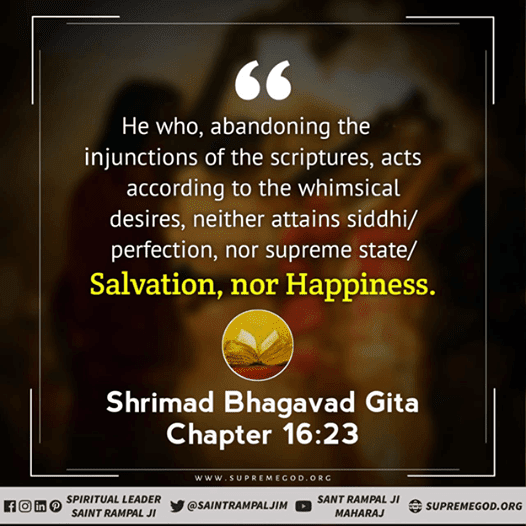
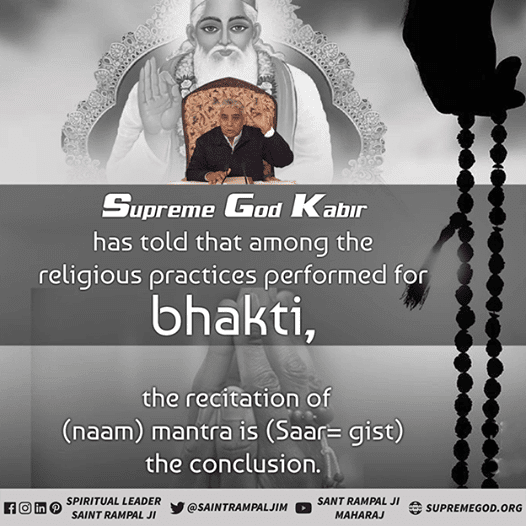
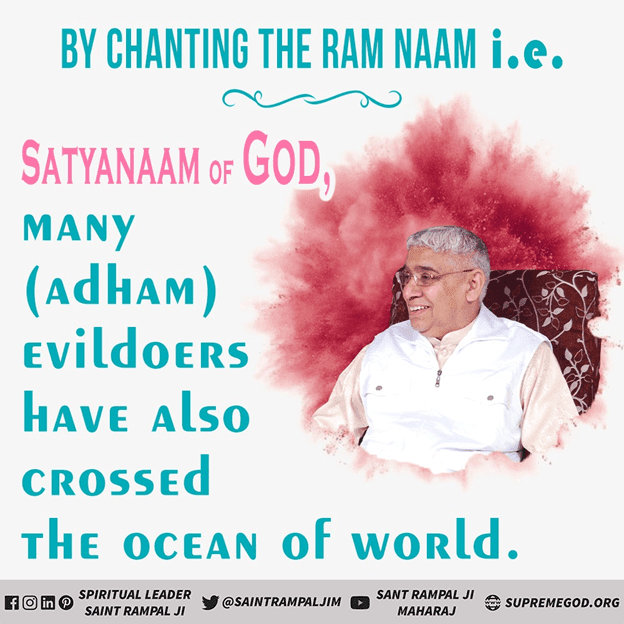
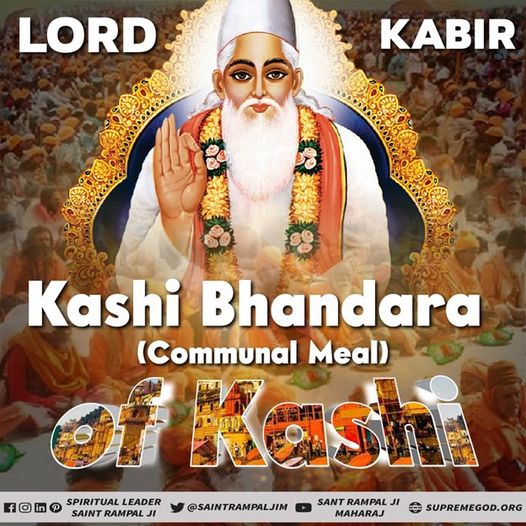
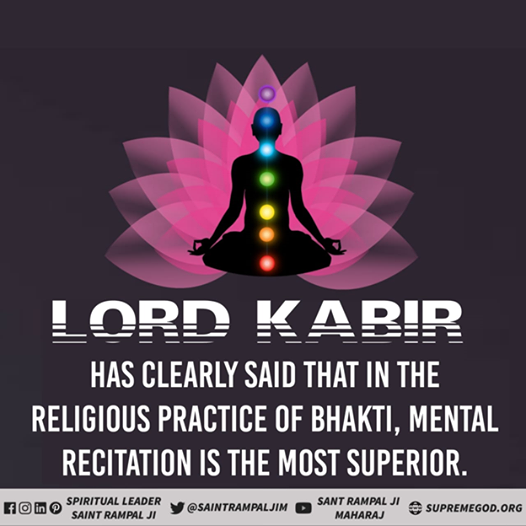
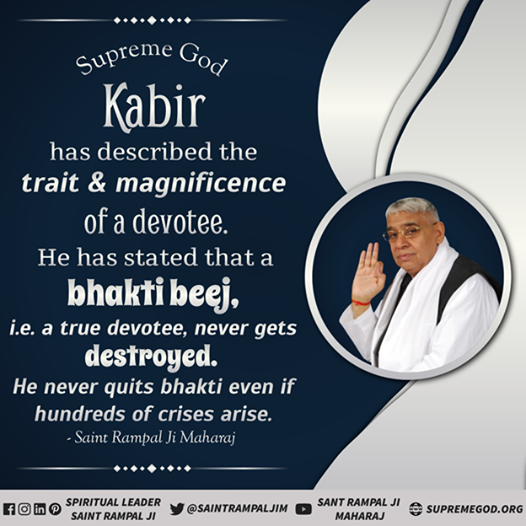

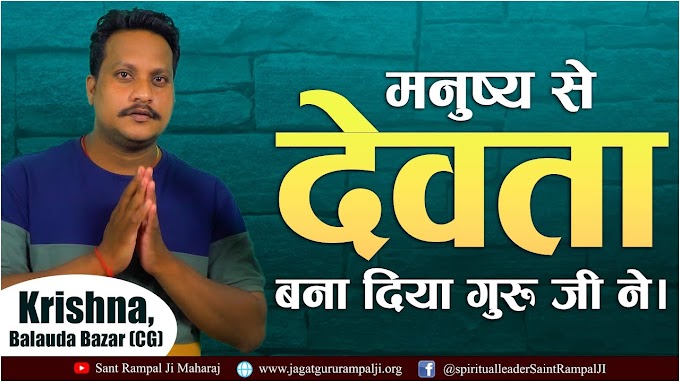
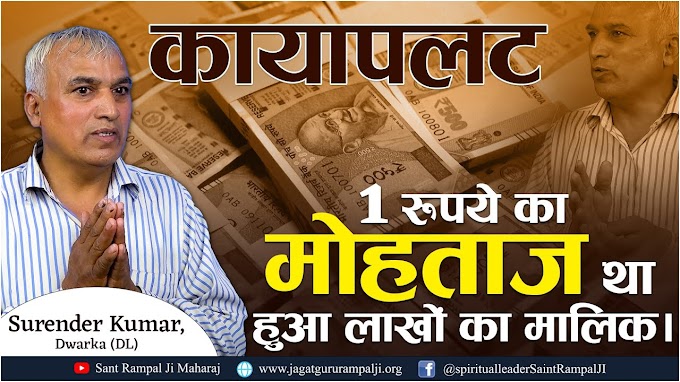

0 Comments